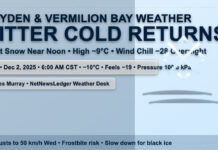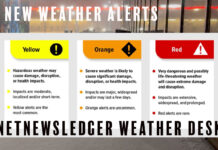 THUNDER BAY – If you are travelling east, a snow squall warning has been issued for the Batchawana Bay region. This section of the highway has been closed several times over the past several days. With the Snow Squall Warning, it is possible that motorists and truckers could experience delays.
THUNDER BAY – If you are travelling east, a snow squall warning has been issued for the Batchawana Bay region. This section of the highway has been closed several times over the past several days. With the Snow Squall Warning, it is possible that motorists and truckers could experience delays.
Snow squall watch in effect for:
- Agawa – Lake Superior Park
- Searchmont – Montreal River Harbour – Batchawana Bay
The threat of snow squalls will linger today although they will be considerably weaker than the recent heavy squalls. They are currently near Montreal River and low visibilities in local heavy snow may be associated. Accumulations of 5 to possible 10 cm are possible before they weaken further tonight.
Visibility may be suddenly reduced at times in heavy snow.
Keep up on Road Conditions
Further north in Ontario there is an Extreme Cold Weather Warning in effect for Washaho Cree First Nation.
Extreme Cold Warning for Washaho / Fort Severn
- Fort Severn
Wind chill values are expected to drop to near or below minus 45 overnight and into Monday morning.
Watch for cold related symptoms and complaints which include:
– Respiratory: shortness of breath, wheezing and cough
– Cardiovascular: chest pain and arrhythmias
– Circulation: colour change of finger and toes, pain, numbness and tickling sensation in extremities
– Muscle: pain, stiffness, swelling, restricted movement, weakness
– Skin: itching, pale.
If you experience these symptoms when exposed to the cold, move indoors and begin warming.
Wear appropriate clothing.
– Always wear clothing appropriate for the weather. Synthetic and wool fabrics provide better insulation. Some synthetic fabrics are designed to keep perspiration away from your body which keep you dry and further reduce your risk.
– Dress in layers with a wind resistant outer layer. You can remove layers if you get too warm (before you start sweating) or add a layer if you get cold.
– Wear warm socks, gloves, a hat and scarf in cold weather. Be sure to cover your nose to protect it.
– If you get wet, change into dry clothing as soon as possible. You lose heat faster when you’re wet.






